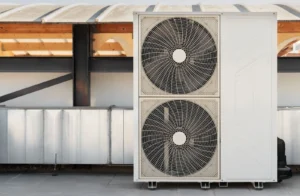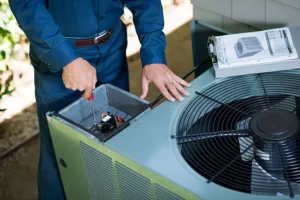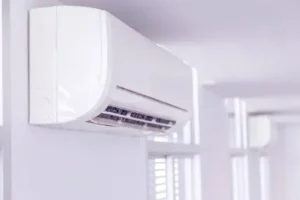When your appliance breaks, the choice between repairing and replacing it can seem daunting. It’s important to consider all of the factors involved to make the best decision for your situation.
This guide will look at some of the most important considerations when making your decision. We’ll also help you understand the benefits and drawbacks of appliance repair and replacement. By the end of this guide, you should have a good idea of which option is best for you!
Outline:
- The Benefits Of Repairing Household Appliances
- The Drawbacks Of Repairing Home Appliances
- The Benefits Of Replacing Home Appliances
- The Drawbacks Of Replacing Home Appliances
- Repair Or Replace – Some Guidelines On How To Make A Choice
- Looking For A Professional Contractor To Repair Your Appliance?
The Benefits Of Repairing Household Appliances
Eco Friendly
Repairs are frequently more environmentally responsible than replacements. You’re reusing the materials and components already on hand when you repair an appliance. That means less new material needs to be produced, saving energy and resources.
Save Money
Appliance repairs usually cost less than appliance replacements. That is because appliance repairs often involve replacing just one part, whereas appliance replacements typically require the purchase of an entirely new appliance.
Reduction Of Waste
It is also true that appliance repair may help to minimize garbage generation in landfills. The old device is frequently discarded when you replace a machine. That creates more waste and takes up valuable space in landfills.
The Drawbacks Of Repairing Home Appliances
Time-Consuming
Appliance repairs can sometimes be time-consuming. That is especially true if you need to wait for parts to arrive or if the repair requires multiple visits from a technician.
May Not Be Worth It
Appliance repairs may not be worth the money or effort in some cases. That is often the case with major appliances close to the end of their lifespan. In these situations, it may be more cost-effective to replace the appliance.

The Benefits Of Replacing Home Appliances
New Features & Technology
When you replace appliances, you have the opportunity to upgrade to a newer model with updated features and technology. That can be especially beneficial if your old appliance is outdated or no longer meets your needs.
Improved Efficiency
Newer appliances are often more energy-efficient than older models. That means that they’ll cost less to operate, which can save you money over time.
Lower Repair Costs
If you buy an energy-efficient appliance, it will almost certainly require few repairs over its lifetime. However, if repairs are needed, they’ll typically be less pricey than those for a previous machine.
The Drawbacks Of Replacing Home Appliances
Initial Cost
One of the most significant drawbacks of appliance replacement is the initial cost. New appliances can be expensive, and you’ll need to factor this cost into your budget.
Disruption To Your Home
Another potential drawback of appliance replacement is the disruption it can cause to your home. Replacing an appliance usually requires some amount of installation, which can be disruptive and messy.
Repair Or Replace – Some Guidelines On How To Make A Choice
Repairing or replacing a broken appliance has benefits and drawbacks, but the choice is up to you. So, if the benefits of appliance repair vs. replacement haven’t swayed you yet, here are a few more things to think about:
The Current Value
Many goods in your house depreciate as they age, such as window air conditioners. Although they are available to many people, no one purchases recent-model because the manufacturer has halted and replaced them with improved versions. Their value fades as furniture, kitchen equipment, and electronics get older.
However, some of your home’s equipment may appreciate over time. Antiques become antique in the future years and have a higher resale value than newer products. The cost of keeping an antique is similar to that of investing. Let’s assume you have a family heirloom piece of furniture in your house that has been handed down through the generations. So, if you spend money today to repair it, you will profit in the long run.
The Expected Life Span
The average lifespan is the amount of time a product will work before it needs to be replaced. The lifespan of an appliance can vary depending on the make, model, and quality. A washing machine’s lifespan is between 11 and 13 years, while a dryer is around 13 years. A refrigerator should last you about 13-14 years, gas ovens last between 15 and 17 years, and a dishwasher has an average lifespan of nine years.
The Cost Of The Repair
Replacing major home appliances is a very costly proposition. In some situations, repairing an appliance may be more expensive than replacing it. That becomes especially true if the device is ancient or out of date and replacement components are no longer available.
However, appliance repair may be less expensive than replacement in other cases. That is often the case with newer appliances that are still under warranty. If an appliance is still under warranty, the manufacturer may cover the cost of repairs.
You should also consider the time and effort required to repair an appliance. In some cases, appliance repair may be more time-consuming and complicated than replacement.
Looking For A Professional Contractor To Repair Your Appliance?
If your appliance requires repair, don’t hesitate to call On Point Service Company. We have the abilities and knowledge to get your appliance back up and running—and we do it all at a fair price.
Please contact us right away or visit our website for more information about our services. We can’t wait to help you get your appliances back in working order!







